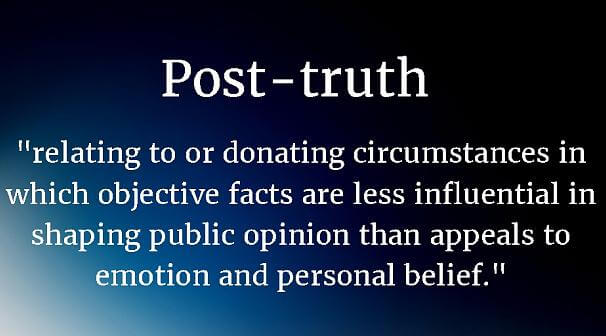
(This is the first of a series of blog posts on post-truth (from 23rd February 2017). The posts are drafts from the upcoming book Truth Wars. The drafts are rough, but as there are new developments daily, I’ve opted for speed over perfection. Comments very welcome, ad hominem attacks, or attacks on particular groups are disallowed – i.e. libtard morons, or alt-right fascists.)
A new word for a new era?
In 2016, the OED awarded “post-truth” the word of the year, defining “post-truth” as: ‘relating to or denoting circumstances in which objective facts are less influential in shaping public opinion than appeals to emotion and personal belief’. “Post-truth” often refers to political debate, brought into sharper focus by the US presidential election. In the words of award-winning commentator, Matthew Norman, “The truth has become so devalued that what was once the gold standard of political debate is a worthless currency.”
The left are inclined to see Donald Trump (or, in the UK, the campaign of misinformation around Brexit, or in Germany and France, the “identitarian” provocations on race), as the problem. This is a simplistic view and while it is intellectually expedient to pin post-truth phenomena on “those guys”, or a “few bad apples”, those are merely a symptoms of a much deeper, more systemic, and much more troubling phenomenon. The left might (mis) characterize 2016 as a victory for “liars” over “truth-tellers”, and while the fact-checkers would agree, this might permit the left, and “elites”, and “mainstream media” to duck responsibility for “post-truth” and its consequences. Perversely, although the right has profited most extensively from post-truth, it is the modus operandi of the elites that has permitted the rise of post-truth and the alt-right movements worldwide.
Why post-truth matters
Our world is characterized by a glut of information and a scarcity of facts. We need facts to make decisions as consumers. Thirty years ago there were “tobacco wars” as big tobacco spent tens of billions to persuade us that smoking was not harmful (despite science that had been around for fifty years and conclusive for decades). Today that war (on you) is fought on many fronts. Is vaccination essential for the health of all children (or does it cause autism)? Is sugar the new tobacco (as harmful to public health and subject to the same kind of disinformation campaign)? Are GMOs dangerous? Is gluten bad for you? Is fluoridated drinking water harmful, or necessary? Do homeopathy and acupuncture work? Does “big pharma” manipulate drug trials to their benefit and our detriment? Do over-the-counter medicines work? Is “low-fat” (or “low carb”) really low and does it matter?
Every day, I will argue, each of us makes dozens of choices that are informed, or misinformed, by truths. We want our choices based upon what is true. Our day may contain mundane choices, such as whether to have toast and cereal (carbs) for breakfast, or whether to go carbohydrate-free, or whether to opt for gluten-free alternatives. Some special days, our voting choices might shape their societies for a generation (2016’s elections and 2017’s ascendance of neo-nationalist and fundamentalist parties around the world.)
The truths upon which these choices depend come from institutions, universities, policy experts in government, business, and often intermediated by the media. The media, even when it tries to be neutral, and because it is commercial, wants to grab and hold our attention. Novelty gets our attention, and manufacturing controversy and drama holds it. In the health sphere, new diets based on breakthrough science are more interesting than “eat more vegetables and fruit.” A scientific controversy around climate change is interesting; the urgent duty we would have to do something were the scientific community right makes for tedious and unpleasant watching. Terrorism makes gripping, if macabre, television. It gets exhaustively (and exhaustingly) covered even though the risk of harm (in the US and Western Europe) is vanishingly small.
If you allow that post-truth is broader than just politics, what does the landscape look like? Are there features of today’s world that exacerbate it and make the consequences more extreme. We are interested in four areas: the news media, corporations, scientific institutions, and (mostly visibly) politics.
In teach of these areas, we ask the questions:
– what are the dimensions of post truth,
– are these phenomena really new and are they an incremental change, or a structural change,
– are corrective mechanisms (for example, fact-checking) effective, and (ergo) is the situation getting better or worse?